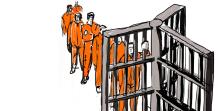Professor Katherine Beckett, whose research spurred the state Supreme Court decision to end capital punishment in Washington, has now teamed up with UW Epidemiology professor Anjum Hajat in a recent op-ed piece in the Seattle Times that draws attention to the major risks incarcerated people will face during the current COVID-19 outbreak. Harsher sentences have dramatically increased the number of middle-aged and elderly prisoners, and 40% of jail inmates now have a chronic condition. This, combined with inhumane disciplinary measures such as solitary confinement and lack of proper healthcare and sanitation supplies, may be a death sentence if COVID-19 takes hold in prisons.
Beckett and Hajat also identify solutions that can be acted on immediately. Releasing and housing medically vulnerable prisoners, and those near the end of their sentence, would slow the spread of the virus and lessen the strain on medical resources in the community, especially in rural areas. Washington State is the forefront of the COVID-19 epidemic, but the UW is also at the forefront of front-line care and COVID-19 related research, including research like Beckett's about our most vulnerable populations.
Read the article in the Seattle Times
